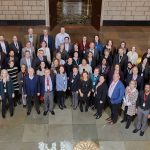This week, we look at the effect of the COVID-19 pandemic on library budgets as well as two important announcements from eLife and PLOS ONE. We also learn how smaller publishers can transition to open access models of publishing. Finally, we consider a different perspective on green open access.
COVID cuts eat into library budgets via The Scholarly Kitchen | 9-minute read
In this analysis, researchers from Ithaka S+R looked at how the COVID-19 pandemic has impacted academic library budgets. Their results from a survey of 638 US academic library directors revealed that around 75% of libraries have experienced budget cuts affecting many areas, including collections and staffing. What’s more, although a quarter of respondents anticipate that the impact of COVID-19 on their budgets will be temporary, another quarter believe it could be permanent.
Publish, then review: preprints to be mandatory at eLife via eLife | 9-minute read
The open access journal eLife has announced that from July 2021, it will only review submitted manuscripts that have already been published as preprints. In an effort to move away from the traditional ‘review, then publish’ model of scholarly publishing, editors at eLife will start shifting their focus from deciding whether a paper should be published to providing an openly available assessment of the work that has been published by the author. This means that reviewer comments – both positive and negative – will be posted alongside the preprint. Nearly 70% of papers under review at the journal are already available on preprint servers, which puts eLife in a good position to become the first major journal to make preprints compulsory. Find out more in this interview with eLife’s Editor-in-Chief Michael Eisen.
PLOS ONE introduces peer-reviewed protocols via PLOS Blogs | 3-minute read
This week, PLOS announced the launch of two new PLOS ONE article types. The first type, Lab Protocols, will describe verified methodologies though step-by-step protocols combined with peer-reviewed articles to provide context for the methods. The protocols will be uploaded to protocols.io, an online platform for sharing detailed interactive protocols. The second type of article, Study Protocols, will allow researchers to share plans for funded research projects that have not yet generated results. PLOS hopes that these new article types, which will be launched in 2021, will shine a spotlight on the importance of good protocol development and reporting for reproducibility in science.
Taking the plunge into open access via The Scholarly Kitchen | 10-minute read
Representatives from IWA Publishing – the publishing division of the International Water Association (IWA) – explain the whats, whys and hows of making a small society publisher’s output openly accessible. With support from Knowledge Unlatched, IWA Publishing aims to make its portfolio of 17 journal titles open access by 2021 using the subscribe-to-open (S2O) model. S2O subscriptions allow publishers to make their journals freely available to all. If, however, subscription revenue dips below a threshold, the journal becomes accessible only to the subscribers.
Is green open access a red herring? via OASPA | 9-minute read
Representatives from several publishing giants – including Springer Nature, Taylor & Francis and Wiley – have signed this ‘open post’ on the Open Access Scholarly Publishing Association (OASPA) blog. In the post, the signatories argue that green open access, which enables authors to archive their own manuscripts publicly, is an inadequate solution for making research accessible because it clutters the scholarly literature with multiple versions of manuscripts and supports the continued dominance of subscription publishing.
On a final note …
This week, we at Open Pharma are celebrating reaching 200 endorsements! We would like to thank all our individual and institutional endorsers for their continued support.
We at Open Pharma would like to continue to encourage all our readers to look after themselves and their community and to continue to follow advice from their country’s government and health organizations.
Coronavirus mental health and well-being resources:






